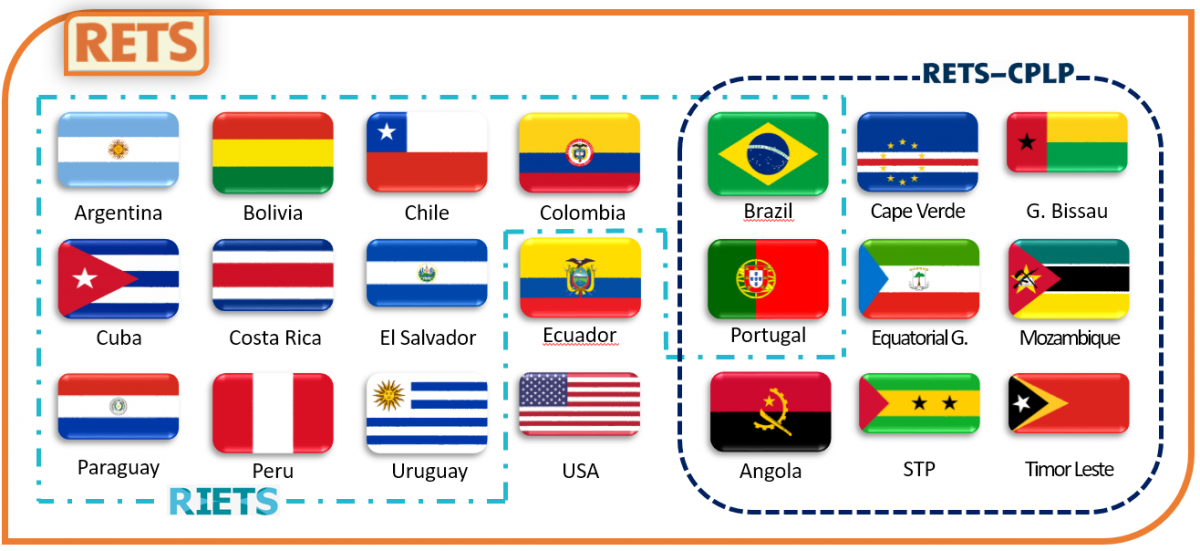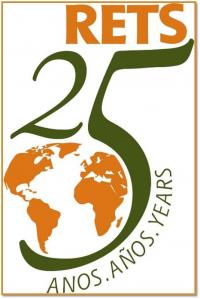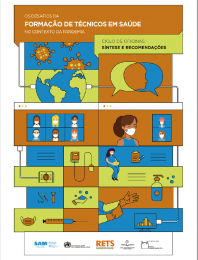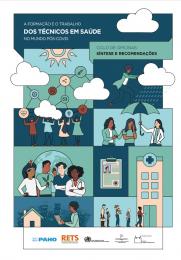The RETS

The International Education Network for Health Technicians (Rede Internacional de Educação de Técnicos em Saúde - RETS) can be defined as an articulation between institutions and organizations involved in the education and qualification of technical health personnel in countries of the Americas, in Portuguese-speaking Africa and Portugal. Its mission is to strengthen national health systems, under the assumption that workers' skills have been considered a fundamental dimension to the implementation of public health policies that meet the needs of populations.
RETS, created in 1996, which Executive Secretariat is the School of Public Health of Costa Rica, worked until 2001, when it was deactivated. In September 2005, with the transfer of the Executive Secretariat to Joaquim Venâncio Polytechnic School of Health (Escola Politécnica de Saúde Joaquim Venâncio - EPSJV/Fiocruz), the Network has been reactivated and now gathers about 120 institutions in 20 countries, besides hosting an important sub-network: the Technical Health Schools Network of Portuguese Speaking Countries Community (Rede de Escolas Técnicas da Comunidade dos Países de Língua Portuguesa - RETS-CPLP).
In 1996, common problems motivated the creation of the Network
In the '50s, the education of health technicians and assistants experienced a big boost and many educational centers with diverse offerings of technical careers were created. In the '70s and early '80s, the Human Resources Development Program of the Pan-American Health Organization (PAHO/WHO) implemented a line of work focused on the area of health technicians´ education. In order to try to identify common problems related to the field of education and work of these personnel, meetings were held in some locations considered strategic, such as Venezuela, Mexico and Cuba, however; with little progress.
At the end of 1995, a reform in the health sector scenario, the Program took up this line of work because of the countries´ expressed demand. At that time, coordinated by PAHO, a comprehensive study of the state of health technicians´ education, which brought together 70 centers in 16 countries in the Americas, was held. The research identified numerous problems, among them, serious deficiencies in the planning of human resources, lack of systematic information on education and work of health technicians and study plans´ downgrading.
The construction of an international network of health technicians´ education was set as a priority, being regarded as an important way to enhance the knowledge and the experience and stimulate the growth of different groups, like teaching, research or health service providers. The official creation of RETS eventually happened in Mexico City in July 1996, during a meeting of representatives from PAHO, Brazil, Colombia, Costa Rica, Cuba and Mexico. At the time the School of Public Health of Costa Rica was defined seat of the Executive Secretariat of the Network, which objectives were:
- facilitate technical cooperation and collaboration among members in education and development of technical health personnel;
- disseminate information resulting from research on workers who are that level in order to strengthen their development and health services involved;
- enhance the accumulation of knowledge, stimulating the integration and growth of groups of teachers, researchers, planners, administrators and service providers;
- promote growth and strengthening their organizational bodies and stimulate the mobilization of financial resources to ensure their sustainability;
- identify the educational needs, as well as other basic needs of the different technical specialties that exist.
In November of the same year, the group has met again in Cuba to discuss the proposed organization of the Network presented by Costa Rica and Mexico. In its first five years of existence, RETS, which gathered only Latin American institutions covered more than 50 members from 21 countries.
In 2005, reactivation marks a new beginning
After four years off, RETS returned to work on September 8th, 2005, when the Executive Secretariat was transferred to Joaquim Venâncio Polytechnic School of Health (Escola Politécnica de Saúde Joaquim Venâncio - EPSJV/Fiocruz), which had been designated as a WHO Collaborating Center for Health Technicians´ Education in July 2004.
During his visit to the School, upon transfer, the then Regional Advisor for the Development of Human Resources in Nursing and Health Technicians of PAHO/WHO, Silvina Malvárez recalled the important role that RETS had played, by fostering the development of the field of health technicians´ education in member countries, and celebrated the Network´s reactivation. “The benefit will be the resumption of this movement, this mobilization”, she said.
“Staying ahead is strategic to us in the networking process due to the possibility of stimulating the production of knowledge on this area of education, supporting the formulation of policies on education, work and health in the regions of Latin America and the Portuguese-speaking African countries”, emphasized the then coordinator of the School´s International Cooperation, Anamaria Corbo, already assuming the purpose of the Network to expand its area of ??operation in the new phase. Today, RETS brings together members of the Americas, Africa and Europe.
When the nodes of the network meet
After the reactivation meeting, which happened in EPSJV/Fiocruz in 2005, some other person meetings were held, to strengthen the integration between the links of the network, in addition to its specific objectives.
The 1st General Meeting of RETS happened in August 2006 in Rio de Janeiro (Brazil), during the International Forum on Education of Health Technicians, conducted under the 11th World Congress on Public Health. Were presented at the event, discussed and approved: the regulation of RETS (Reg 2006), the reference document ‘Basis for a Development Plan of Health Technicians’ (‘Bases para um Plano de Desenvolvimento de Técnicos em Saúde’) and the work plan of the network for 2007-2008, which lasted until late 2009.
On May 22nd and 23rd of the following year, some members of the Network met in Havana (Cuba) during the ‘I Congress of Health Technologies’, in order to validate an instrument contributing to the achievement of a possible unity categorization of careers and areas of technical education in order to accommodate the educational reality of the countries within the RETS. The meeting was attended by about 20 people, representing 14 institutions from seven countries: Angola, Brazil, Colombia, Costa Rica, Cuba, Mexico and Uruguay.
In 2009, the 2nd General Meeting of RETS was held. At the meeting, which took place on December 9th, 10th and 11th in EPSJV/Fiocruz, the Work Plan of RETS for the triennium 2010-2012, which remained in force until 2013, and the work plan of its two sub networks were defined for the period 2010-2013. The event program included, in addition to specific meetings for members of the network, some activities open to the public: the lecture ‘Technical cooperation in health within UNASUR and CPLP’ (‘A cooperação técnica em saúde no âmbito da Unasul e da CPLP’), issued by the director of the Center for International Relations in Health (CRIS – Fiocruz) and then, Brazilian representative of the Coordinating Committee of UNASUR-Health, Paulo Buss, and the director of Cooperation of the CPLP, Manuel Lapão; and roundtables ‘Experiences of education from Primary Health Care – PHC’ (‘Experiências de formação a partir da Atenção Primária à Saúde - APS)’, ‘The issue of culture in health workers´education’ (‘A questão da cultura na formação dos trabalhadores da saúde’) and ‘The production of knowledge about health technicians: the importance of observatories of human resources for health’ (‘A produção de conhecimento sobre os técnicos em saúde: a importância dos observatórios de recursos humanos em saúde’).
The 3rd RETS General Meeting was held on November 7 and 8, 2013, in Recife, Brazil, on the eve of the III World Forum on Human Resources in Health. At the meeting, members of the Network designed a new RETS Work Plan (2014-2017). Parallel to the RETS meeting were held specific meetings of its two sub-networks: RETS-Unasul and RETS-CPLP. The theme of the meeting was' The Network as a space for the production of knowledge about the education and work of health technicians' and its programming included the lecture 'Health in the Post 2015 Development Agenda: the role of the technical worker in health and with Paulo Buss (Center for International Relations in Health / Fiocruz), and the round table 'Networking: the challenge of institutionalization and the definition of commitments', with Silvia Cassiani, PAHO/WHO; Manuel Lapão, for the CPLP, and Isabel Duré, for UNASUR. About 70 people representing the institutions that make up the Network and other invited institutions participated in the meeting.
To consolidate the International Network of Health Technicians Education (RETS) and its mission to support the training and qualification of technical workers in health, in international cooperation processes in the Americas and in the Community of Portuguese Speaking Countries (CPLP). This was the main objective of the 4th General Meeting of RETS, held from November 12 to 14, 2018, in Rio de Janeiro, together with the 4th RETS-CPLP Ordinary Meeting. For three days, about 40 institutional representatives evaluated the work done over the years and, among other things, drafted the network work plan for the period 2019-2022. The group also defined and agreed with a communication plan for RETS, as well as relegated EPSJV/Fiocruz as the executive secretariat of the Network. On the first day of the event, after the opening ceremony, the seminar '40 years of Alma-Ata and the role of health technical workers in the implementation of universal health systems' was held, with the presence of Paulo Buss, former president and current coordinator of the Center for International Relations in Health (CRIS) of Fiocruz, and Isabel Duré, Secretary of Health of the Ministry of Health and Social Development of Argentina. The seminar was opened to the public and broadcasted live over the Internet. At the end of the meeting, members of RETS issued the Declaration of Rio de Janeiro, in which they asked local, regional and global authorities to pay more attention to the training and work of health technicians.
New times for RETS
On Friday, May 22, 2020, RETS held its first virtual meeting with Latin American member countries. The opening of the meeting included the speech of the head of the Human Resources Unit of PAHO/WHO, Fernando Menezes, the representative of the Center for International Relations in Health of the Oswaldo Cruz Foundation (Cris / Fiocruz) Sebastian Tobar and the director of the Joaquim Venâncio Polytechnic School of Health, Anakeila Stauffer.
The meeting was attended by approximately 45 people, including representatives from member institutions and partner institutions such as the Network of Schools and Training Centers in Public Health in Latin America (RESP), the Regional Network for Interprofessional Education in the Americas (REIP) and the Lisbon School of Health Technology (ESTsL-Portugal).
On July 1, 2020, the 1st Virtual Meeting of the Network of Technical Schools in Health of the Community of Portuguese Speaking Countries (RETS-CPLP) was held, with the presence of representatives of six of the nine countries that make up the Community. At the opening of the event, CPLP's Director of Cooperation, Manoel Clarote Lapão, highlighted the importance of the meeting, especially in the context of the pandemic that affects all member countries, albeit in different measures, and that requires a change in the strategy of the Network that allows the work to continue. The representative of the Center for International Health Relations at the Oswaldo Cruz Foundation (Cris / Fiocruz) Sebastian Tobar, also emphasized the relevance of the meeting and Cris's support for strengthening the group. Finally, the director of the Escola Politécnica de Saúde Joaquim Venâncio (EPSJV), coordinating institution of RETS-CPLP, Anakeila Stauffer, welcomed all those present and sought to highlight the role of the Network at a time when social inequalities, inter and intra-country, make the challenge of overcoming the Covid-19 pandemic even more complex.
More than 30 people, representing institutions from Angola, Brazil, Cape Verde, Mozambique, Portugal, and São Tomé and Príncipe, were present. Besides, we also registered the presence of Luiz Ary Mesina, representing the University Telemedicine Network (RUTE). Unfortunately, in that first virtual meeting, three countries in the Community were unable to attend: Equatorial Guinea, Guinea Bissau, and East Timor. The main objective of the meeting was to discuss the scenario of countries concerning work and the training of health technicians in times of Covid-19 pandemic.
In 2021, a new sub-network: RIETS
On February 4, 2021, in a meeting (portuguese-spanish) held virtually with representatives of the Ibero-American General Secretariat (SEGIB), Fiocruz, and several Ibero-American institutions of the RETS, the creation of the Ibero-American Network of Education of Health Technicians (RIETS) was made official. At the 1st RIETS Ordinary Meeting (portuguese-spanish), which took place shortly after the creation ceremony, the Network's regulations (portuguese-spanish) and work plan for the biennium 2021-2022 (portuguese-spanish) were approved. At the time of its creation, RIETS already had members from 12 of the 22 countries that make up the Iberoamerican community: Andorra, Argentina, Bolivia, Brazil, Colombia, Costa Rica, Cuba, Chile, Ecuador, El Salvador, Spain, Guatemala, Honduras, Mexico, Nicaragua, Panama, Paraguay, Peru, Portugal, Dominican Republic, Uruguay and Venezuela.
Strong action in the context of the COVID-19 pandemic and celebrations for 25 years of existence
 Among the activities carried out during the pandemic, we highlight:
Among the activities carried out during the pandemic, we highlight:
-
2021 workshop series: Challenges in training healthcare technicians in the context of the pandemic
-
2022 workshop series: Training and work of healthcare technicians in the post-COVID world
The fourth workshop in the 2021 series also celebrated the 25th anniversary of RETS. The event featured numerous testimonials and a commemorative video.
In addition, both series resulted in a publication summarizing the workshops and providing some recommendations on the topic.
2025: the return of in-person meetings
“I would like to highlight the importance of this meeting as a space for strengthening international cooperation on health issues within the CPLP,” said Carlos Eduardo Colpo Batistella, coordinator of International Cooperation at the Joaquim Venâncio Polytechnic School of Health (EPSJV/Fiocruz) PSJV, as he opened the 5th Ordinary Meeting of the RETS-CPLP, held on June 2 and 3, 2025, at the Lisbon School of Health Technology of the Lisbon Polytechnic Institute. Ordinary Meeting of RETS-CPLP, held on June 2 and 3, 2025, at the Lisbon School of Health Technology of the Lisbon Polytechnic Institute (ESTeSL/IPL). With delegations from seven of the nine countries that make up the community, the main objective of the meeting was to draw up the Network's Work Plan for the period 2025-2028. During the two days of the meeting, the countries were presented, numerous discussions were held, and, among other things, the creation of a special interest group (SIG) was approved, which will meet monthly to implement the activities and actions to be carried out during that period.
Held on October 9 and 10, 2025, the 2nd Ordinary Meeting of the Ibero-American Network of Health Technicians Education (RIETS) was attended in Rio de Janeiro by representatives of institutions from 11 of the 22 countries in the community: Argentina, Bolivia, Brazil, Chile, Colombia, Costa Rica, El Salvador, Paraguay, Peru, Portugal, and Uruguay. In addition, several other institutional representatives followed the meeting via Zoom, including a representative from Mexico, a country that is returning to the network after a period of absence.


